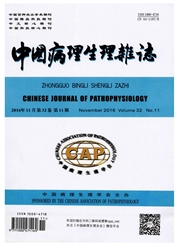

 中文摘要:
中文摘要:
目的:研究喜树碱(CPT)对刀豆蛋白A(ConA)介导的小鼠T淋巴细胞体外活化、增殖及细胞周期的影响。方法:以ConA刺激小鼠T淋巴细胞,建立小鼠T淋巴细胞活化、增殖的模型,以不同浓度的CPT作用于该模型,流式细胞术检测T细胞早期活化标志CD69分子的表达;以活体染料羧基荧光素乙酰乙酸(CFDA-SE)染色流式细胞术分析CPT在ConA刺激下小鼠淋巴细胞的增殖相关指数(PI);以碘化丙啶染色流式细胞术分析细胞周期的分布情况。结果:ConA作用6h后流式细胞术分析显示CD69的表达率为(58.88±0.55)%,不同浓度的CPT组(10nmoL/L、20nmol/L、50nmol/L、100nmol/L)CD69的表达率分别为(55.48±0.98)%、(54.67±1.05)%、(50.40±0.82)%、(42.47±1.32)%,均可明显抑制CD69的表达(P〈O.01);ConA刺激48h后流式细胞术分析显示,不同浓度的CPT组(10nmol/L、20nmol/L、50nmol/L、100nmol/L)的增殖指数(PI)明显低于对照组(P〈0.05);细胞周期分析显示刺激48h后不同浓度的CPT组(10nmol/L、20nmol/L、50nmol/L、100nmol/L)均出现明显的凋亡峰(apoptosis peak,AP),sub-G1期、G0/G1期细胞的比率明显高于ConA刺激组(P〈0.01)。结论:CPT可明显抑制ConA刺激的T淋巴细胞的活化、增殖,同时使淋巴细胞阻滞于G0/G1期。
 英文摘要:
英文摘要:
AIM: To study the effects of camptothecin (CPT) on the activation, proliferation and cell - cycle distribution of the mouse T lymphocytes stimulated by concanvalin A (ConA) in vitro. METHODS: A model of T cell activation and proliferation was established by stimulated the cells with Con A. T cells were treated with different concentrations of CPT. The expression of CD69, the early marker of CD3^+ T cell activation, was measured by FACS. The proliferation index was determined by carboxyl fluorescin diacetate succinmidyl ester by flow cytometry. The cell - cycle distribution was analyzed by propidium iodide staining. RESULTS: After stimulation with Con A for 6 h, the activation rate of CD69^+ T cell in Con A group was (58. 88±0. 55 ) %. The percentages of CD69 positive cells were (55.48±0. 98 ) %, (54. 67±1.05) %, (50. 40±0. 82) %, (42.47±1.32) %, correspond to the treatments with different concentrations of CPT ( 10 nmol/L, 20 nmol/L, 50 nmol/L, 100 nmol/L), respectively. After 48 h treatment with Con A, the proliferation index in different concentrations of CPT treatment ( 10 nmol/L, 20 nmol/L, 50 nmol/L and 100 nmol/L) exerted a definite inhibitory effect on the proliferation ( P 〈0. 01 ). Moreover, the cell-cycle distribution analysis showed that apoptosis peak was observed in different concentrations of CPT treatment after 48 h cultured with Con A. CONCLUSION: CPT significantly inhibits the early stages of the Con A-induced T cell activation and proliferation, and detents the T lymphocytes in G0/G1 phase.
 同期刊论文项目
同期刊论文项目
 同项目期刊论文
同项目期刊论文
 期刊信息
期刊信息
